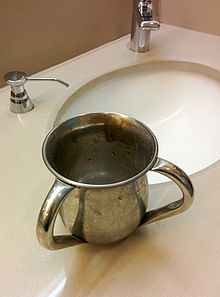Mencuci tangan dalam Yudaisme
Hukum Yahudi saat ini menjelaskan beberapa jenis pencucian tangan (bahasa Ibrani: נטילת ידיים, netilat yadayim):
- Mencuci tangan saat orang bangun dari tidur (dikenal dalam bahasa Yiddish sebagai נעגל וואַסער, negel vasser), membasuh dari sebuah wadah sebanyak tiga kali, secara bergantian, pada setiap tangan. Pembasuhan tersebut dikatakan menghilangkan roh jahat dari jari-jari seseorang.[1]
- Mencuci tangan sebelum berdoa.[2]
- Mencuci tangan saat orang menyentuh bagian-bagian vitalnya, atau bagian asam dari tubuhnya (kecuali wajahnya), atau saat orang menggunting kukunya[3]
- Mencuci tangan saat orang meninggalkan kamar mandi atau permandian[3]
- Mencuci tangan saat orang meninggalkan kuburan[3]
- Mencuci tangan sebelum makan roti yang disajikan dalam perjamuan orang, dan hanya roti yang terbuat dari salah satu dari lima bahan utama (gandung, jelai tanam spelt, jelas liar,[a] dan oat)[6]
- Mencuci tangan setelah menyantap makanan dimana garam Sodom disajikan di meja[7]
- Mencuci tangan (diterapkan oleh Cohanim, atau para imam dari beberapa komunitas) sebelum memberkati orang-orang, seperti yang dijelaskan dalam Pemberkatan Sacerdotal (Heb. ברכת כהנים).[8]
- Mencuci tangan saat, sebelum disantap, orang mencelupkan potongan makanan ke dalam sebuah cairan (seperti air, madu, minyak, dll) yang kemudian menempel ke potongan tersebut, dengan pengecualian buah-buahan, yang dipandang tak diwajibkan untuk mencuci tangan.[9]


Referensi
sunting- ^ Shulhan Arukh (Orach Chaim 4:2; 4:18), based on the Babylonian Talmud, Shabbat 108b (end) — 109a. Others say that this hand washing is required before reciting the Shema in the morning, or praying, or even studying the words of Israel's Sages, such as is alluded to in the Babylonian Talmud, Berakhot 11b. "R. Hiyya, the son of Ashi has said: 'Many times I would rise up [in the morning] to go before Rab in order to recite our readings in the Sifra of Rab's Beit Midrash. Rab would first proceed by washing his hands and blessing [over them], and only then would he recite for us the readings'." Compare Maimonides, Code of Jewish Law (Mishne Torah, Hil. Berakhot 6:2). Others prescribe the washing of hands, not only for the Morning Prayer (Shacharit), but for every prayer. (See: the Yemenite Jewish Prayer Book, Tiklāl Etz Ḥayim, with a commentary by Rabbi Yihya Saleh, and Tiklāl Qadmonim of Rabbi Yiḥya al-Bashiri).
- ^ Shulhan Arukh (Orach Chaim 92:4–5; 233:2), based on the Babylonian Talmud, Berakhot 15a. This hand washing is unique, insofar that it does not require the use of a vessel.
- ^ a b c Shulhan Arukh (Orach Chaim 4:18)
- ^ Amar, Zohar (2015). Flora and Fauna in Maimonides' Teachings (dalam bahasa Hebrew). Israel: Kfar Darom. hlm. 157–159.
- ^ Amar, Zohar (2011). Five Types of Grain: Historical, Halachic, and Conceptual Aspects (dalam bahasa Hebrew). Machon Har Beracha. hlm. 62; 113–116.
- ^ Shulhan Arukh (Orach Chaim 158:1)
- ^ Shulhan Arukh (Orach Chaim 181:1), based on the Babylonian Talmud, Berakhot 53b and Hullin 105a—b. The salt of Sodom was said to be so potent that if hands were not washed after touching it, those hands with the salt residue could blind one's eyes (Hullin 105b). Some communities no longer practice this washing at the conclusion of their meals, claiming that, today, the salt of Sodom is no longer served at the dinner table. Their practice in this regard seems to be based on a teaching in the Tosafot, on Eruvin 17b, s.v. מים אחרונים חובה. Other communities persist in the old practice, since there is a teaching that states that although the underlying reason behind a certain ruling has been cancelled, their enactment has not been cancelled. Another reason given is that in every kor (Homer (unit)) of salt there is to be found a qurtov of salt of Sodom, which amounts to approximately 5.4 milliliters – 9.3 milliliters, a quantity still capable of blinding an individual (see HaRif on Tractate Hullin (ed. Yosef Qafih), Jerusalem 1960, p. 83).
- ^ Shulhan Arukh (Orach Chaim 128:6). Cf. Rabbi Yaakov Castro's commentary, Arakh Leḥem (ibid.). The reason for the disparity in Jewish custom in this case is owing to the ambiguity of the teaching, which simply states that a Cohen (priest of Aaron's lineage) is not permitted to stand and bless the people with unwashed hands. Some hold this to mean the washing of hands in the morning, while others hold this to mean the washing of hands immediately prior to blessing the people.
- ^ Babylonian Talmud, Pesahim 115a. While the Shulhan Arukh (Orach Chaim 158:4) requires the washing of hands prior to eating fruits that are merely damp with one of the seven liquids, Maimonides does not mention this stringency in his Mishne Torah (Hil. Berakhot 6:1). Rabbi Hayim Kessar, in his commentary "Baal Shem Tov" (ibid.), says that the enactment only applied to dipping fruits or vegetables in a liquid, but not when wetness merely clung to those fruits or vegetables.
- ^ wild barley and oats: The Hebrew words used here are shippon and shibboleth shu'al, which RASHI translates in this order, "rye (Secale cereale) and oats (Avena sterilis)". The same Hebrew words are interpreted differently by Maimonides, who calls shippon "a kind of wild barley," later called by him in Arabic al-dawsar (Aegilops), and calls shibboleth shu'al in Mishnah Pesahim 2:5 "wild barley" (Hordeum spontaneum)[4][5]
Pranala luar
suntingWikimedia Commons memiliki media mengenai Netilat yadayim.